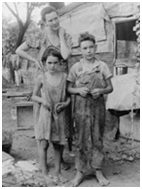|
 |
|
 |
The Wall Street Crash - Business Ethics
The Wall Street Crash (October 1929)
Famous for... The most devastating stock market crash in American history This led to the Great Depression of the 1930’s with poverty and high unemployment.
How much did share prices fall?
Stock (or company share) prices nose dived in the American stock market in Wall Street, New York. It started on 24th October (Black Thursday), but the biggest price falls (nearly a quarter) happened on Black Monday and Tuesday (28th and 29th October). This collapse:
Results of the crash
1. Great Depression The crash destroyed:
This led to:
Pictured right is a poor family in California during the Depression.
2. Suicide for savers Investors worldwide lost loads of money, particularly in America where people borrowed money to invest.
3. Attacks on capitalism and democracy Failure of businesses to provide prosperity and jobs for everyone boosted the popularity of
communism and fascism - like the dictatorships of
Ordinary Americans weren’t happy with the huge gap between rich and poor (in 1929 the richest 5% got a third of all personal income).
American capitalism was saved by the election of Franklin D. Roosevelt ,pictured right, as president in 1933. His New Deal policies:
4. Credit crunch Bank lending dried up, hitting jobs. Many banks also went bust, because:
5. Collapse of worldwide food prices This was caused by lower demand from increased poverty, hitting farmers (as shown in John Steinbeck’s, pictured right, novel, The Grapes of Wrath).
Isn’t the crash similar to the financial crisis of 2007-8? Yes but... The impact on share prices and the world economy wasn’t nearly so damaging - why? Governments took effective action to prevent it becoming a global depression (instead it triggered off what is now known as the Great Recession). In 2007 there was a big fall in share prices and a credit crunch caused by banks (particularly in America and Britain) which
The American investment bank, Lehman Brothers, went bust in September 2008 and financial institutions in America and Britain were saved by big government bailouts including:
As in the 1930’s, the banks in America are now hugely unpopular, fuelled by the public disgust at their huge salaries – AIG was re-named: Arrogant, Incompetent, Greedy. The banks now have greater government regulation to (hopefully) prevent a similar crisis happening again.
Key quotes Stock prices have reached what looks like a permanently high plateau. - Irving Fisher, pictured right, (American economist, just before the Wall Street Crash).
The sense of responsibility in the financial community for the community as a whole is not small. It is nearly nil. - J.K. Galbraith, pictured right (in his book, The Great Crash, 1961).
Today, basically, on Wall Street, the big money is made by taking risks. - Bernard Madoff, pictured right, American financier, jailed for investment fraud.
Greed is all right. - Ivan Boesky, pictured right, American financier, jailed for illegal stock trading This is similar to Gordon Gekko’s (pictured right below) statement in the 1987 film,
Wall Street: Greed - for lack of a better word – is good.
The nation cannot prosper long when it favours only the prosperous. - Barack Obama, pictured right, American president. |
|
|
||
|
|
|
||
|
||
| Copyright © wisdomtowin.com All Rights Reserved | ||
|












